April 12, 2022
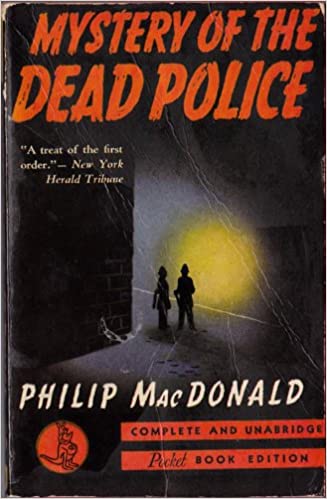 I do so love me a good Pocket Book (not “pocketbook” as in the old-timey word for a smallish purse, at least usually), both the initial-capped brand of books made mainly in the middle of last century, and made to naturally fit in a pocket, but also the many books of the same size but not under the actual kangaroo-reading-a-book-with-a-backup-book-in-the-pouch-logo’d brand. For one, many of this ilk fell into the mystery genre (which I like), though sci-fi, romance, westerns, all found their way into pockets. But also, just the idea of a non-massive book that was easily totable for the bus, or the park bench, or the couch, or anywhere, so you were always ready for reading – I like, that too! Add in that many of the books have grab-your-eyes covers (it was all about getting those newsstand eyeballs), and, well, me and pocket books (branded and not) get along. Which isn’t to say I like every single pocket-sized book, as there are of course as many clunkers in that book-size-genre as any other. Even the book I’m going to Cocktail Talk from today, the Mystery of the Dead Police, didn’t set my world on fire. An interesting set up (London police being killed at random), but the main characters just didn’t grab, and neither did the writing in the main. However, being a pocket-sized book, it wasn’t an inordinately long read, and still had some good twists here and there, but most of all it has the below quote, where two characters drink White Ladies (after mulling about drinking some other choice classics). How often do book characters drink White Ladies? Not enough! Honestly (why not!) speaking of “not enough” I don’t think there are enough White Ladies being consumed today – I’ll bet half the bars within say 20 minutes of me even in Seattle (home of genius bartenders) wouldn’t know what a White Lady was (gin, lemon, Cointreau, egg white), sadly. But at least our pocket-book pals below know!
I do so love me a good Pocket Book (not “pocketbook” as in the old-timey word for a smallish purse, at least usually), both the initial-capped brand of books made mainly in the middle of last century, and made to naturally fit in a pocket, but also the many books of the same size but not under the actual kangaroo-reading-a-book-with-a-backup-book-in-the-pouch-logo’d brand. For one, many of this ilk fell into the mystery genre (which I like), though sci-fi, romance, westerns, all found their way into pockets. But also, just the idea of a non-massive book that was easily totable for the bus, or the park bench, or the couch, or anywhere, so you were always ready for reading – I like, that too! Add in that many of the books have grab-your-eyes covers (it was all about getting those newsstand eyeballs), and, well, me and pocket books (branded and not) get along. Which isn’t to say I like every single pocket-sized book, as there are of course as many clunkers in that book-size-genre as any other. Even the book I’m going to Cocktail Talk from today, the Mystery of the Dead Police, didn’t set my world on fire. An interesting set up (London police being killed at random), but the main characters just didn’t grab, and neither did the writing in the main. However, being a pocket-sized book, it wasn’t an inordinately long read, and still had some good twists here and there, but most of all it has the below quote, where two characters drink White Ladies (after mulling about drinking some other choice classics). How often do book characters drink White Ladies? Not enough! Honestly (why not!) speaking of “not enough” I don’t think there are enough White Ladies being consumed today – I’ll bet half the bars within say 20 minutes of me even in Seattle (home of genius bartenders) wouldn’t know what a White Lady was (gin, lemon, Cointreau, egg white), sadly. But at least our pocket-book pals below know!
“What about a cocktail,” said Nicholas Revel, and sat himself down to face her. His hand pressed the bell push upon the table leg.
Jane, as she has confessed, goggled.
“I . . .” she began. “What . . .”
Giulio came hurrying.
“Dry Martini?” said Nicholas Revel. “Bronx? Sidecar? White Lady? . . . Try a White Lady – yes, a White Lady’s just the thing for this morning. Giulio, two large White Ladies – not too much lemon, and make it snappy.”
— Philip MacDonald, Mystery of the Dead Police
Tags: Bronx, Cocktail Talk, Cointreau, Dry Martini, egg white, Gin, lemon, Mystery of the Dead Police, Sidecar, White Lady
Posted in: Cocktail Talk, Gin, Liqueurs
November 2, 2021
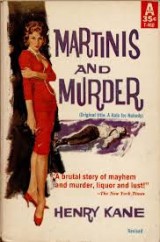 Way back now, oh, 6 years ago (wowza, times flies) or thereabouts I first read the Henry Kane pulper Martinis and Murder, starring detective, drinker, dancer (well, probably), romancer (certainly), and puncher Peter Chambers. And had a number of Cocktail Talks from it (check out Martinis and Murder Part I, Part II, and Part III to get caught up a bit). But recently I was hankering for some pocket-sized pulp reading, as I often am, and was pulled in by its catchy title and even-more-catchy cover, so re-read it. And, you know what? I found even more Cocktail Talk worthy quotes. The book is spilling boozy goodness (around some murdering and mystery-ing and hard-boiled action and smooching and such). Heck, in six years from now, I’ll probably read it again, and find even more potable quotables. But for today, let’s go with the below.
Way back now, oh, 6 years ago (wowza, times flies) or thereabouts I first read the Henry Kane pulper Martinis and Murder, starring detective, drinker, dancer (well, probably), romancer (certainly), and puncher Peter Chambers. And had a number of Cocktail Talks from it (check out Martinis and Murder Part I, Part II, and Part III to get caught up a bit). But recently I was hankering for some pocket-sized pulp reading, as I often am, and was pulled in by its catchy title and even-more-catchy cover, so re-read it. And, you know what? I found even more Cocktail Talk worthy quotes. The book is spilling boozy goodness (around some murdering and mystery-ing and hard-boiled action and smooching and such). Heck, in six years from now, I’ll probably read it again, and find even more potable quotables. But for today, let’s go with the below.
I came back and I asked, “How about some of the finest Sidecars ever concocted?”
“If you let me watch.”
“Why not?”
She trailed behind me. I turned and pushed her against the wall of the kitchen and kissed her hard.
“That for inspiration? she gasped.
“That’s for nothing,” I said.
I went to work with lemons and Cointreau and Cognac.
We brought the mixer into the living room, and in no time at all, fleece gathered.
–Henry Kane, Martinis and Murder
September 14, 2021
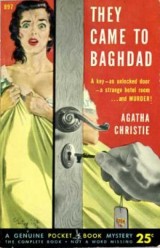 Agatha (Christie, naturally — not to throw shade on other Agathas, but really, if just using the first name “Agatha” don’t most people’s minds head towards her? Just me?) is deservedly known best for her detective (whether Belgian, small town observer, or husband-wife team) books. But she wrote others, too! Some falling into what I’d call “international intrigue,” including They Came To Baghdad. She was a well-traveled writer, with a flair for description, and so writing more globe-trotting – as opposed to set in the UK – books makes sense. Though, I have to admit, there are lots of mysterious threads intertwining here, but hey, she knows her stuff. Basically, after some set-up and stage-setting and character introducing, and a lot of “what’s happening here”-ing, the story follows Victoria Jones, who loses her job, meets a nice chap in a park, decides she’s in love, follows him (by picking up a random job with free airline tickets) to Baghdad, and drops right into a worldwide conspiracy, nearly gets killed, gets kidnapped, goes on an archeology dig, and stays in a hotel run by a man named Marcus who likes to buy drinks, which are delivered by a waiter named Jesus. And a whole lot more! There are murders, twists, neat scenes, and more drinks. Well worth picking up!
Agatha (Christie, naturally — not to throw shade on other Agathas, but really, if just using the first name “Agatha” don’t most people’s minds head towards her? Just me?) is deservedly known best for her detective (whether Belgian, small town observer, or husband-wife team) books. But she wrote others, too! Some falling into what I’d call “international intrigue,” including They Came To Baghdad. She was a well-traveled writer, with a flair for description, and so writing more globe-trotting – as opposed to set in the UK – books makes sense. Though, I have to admit, there are lots of mysterious threads intertwining here, but hey, she knows her stuff. Basically, after some set-up and stage-setting and character introducing, and a lot of “what’s happening here”-ing, the story follows Victoria Jones, who loses her job, meets a nice chap in a park, decides she’s in love, follows him (by picking up a random job with free airline tickets) to Baghdad, and drops right into a worldwide conspiracy, nearly gets killed, gets kidnapped, goes on an archeology dig, and stays in a hotel run by a man named Marcus who likes to buy drinks, which are delivered by a waiter named Jesus. And a whole lot more! There are murders, twists, neat scenes, and more drinks. Well worth picking up!
“Come and have a drink with us Miss Jones. Martini – Sidecar? This is Mr. Dakin. Miss Jones from England. Now then, my dear, what will you have?”
Victoria said she would have a Sidecar “and some of those lovely nuts?” she suggested hopefully, remembering that nuts were nutritious.
“You like nuts? Jesus!” He gave the order in rapid Arabic. Mr. Dakin said in a sad voice that he would have a lemonade.
“Ah,” cried Marcus, “but that is ridiculous.”
–Agatha Christie, They Came to Baghdad
March 31, 2015
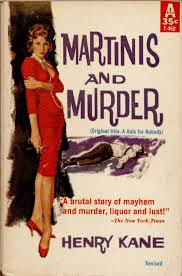 We are now onto the third Cocktail Talk post featuring drinky talk from a book by Henry Kane. Please, please, for the love of all that’s dear to you, go back and read Part I and Part II, because you’ll only kick yourself when you miss them. Though the below may be my favorite, just cause you don’t see Sidecars come up in literature that often – and you need to savor them when they do!
We are now onto the third Cocktail Talk post featuring drinky talk from a book by Henry Kane. Please, please, for the love of all that’s dear to you, go back and read Part I and Part II, because you’ll only kick yourself when you miss them. Though the below may be my favorite, just cause you don’t see Sidecars come up in literature that often – and you need to savor them when they do!
I pursed my lips. I said, ‘Two sidecars.’
We sipped and looked at each other and set them down.
‘Let’s pay and leave,’ Edith said. ‘Mine stinks. And you look like yours does, too. Sacrilege. I’m going home. Got work.’
I put her into a taxi.
‘Bye, Red. Be seeing you.’
I walked home and went straight to the kitchen and fused lemon and Cointreau and cognac and in the living room I lapsed into beautiful beatitude.
–Henry Kane, Martinis and Murder
May 22, 2012
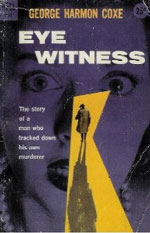 My last post of a book from George Harmon Coxe was in 2008. Jaysus. I wonder how many drinks you’ve had since then? Who do you think’s had more, you, me, or Barack Obama? I only ask cause when that last post went up, it was August 26th, 2008, the same day he was nominated for Pres. Anyway, I digress. Much like that that last Cocktail Talk post way back when, this GHC (that’s what he wanted to be called after two rye shots) quote is from a book featuring mystery-solving photographer Kent Murdock. That sounds like a career path every kid should aspire to. This pocket-book is called Eye Witness, and in it Kent roughs up and gets roughed up, uncovers the clues, charms the ladies, and has a fair number of drinks. In the below quotes, it’s actually both the charms and the drinks:
My last post of a book from George Harmon Coxe was in 2008. Jaysus. I wonder how many drinks you’ve had since then? Who do you think’s had more, you, me, or Barack Obama? I only ask cause when that last post went up, it was August 26th, 2008, the same day he was nominated for Pres. Anyway, I digress. Much like that that last Cocktail Talk post way back when, this GHC (that’s what he wanted to be called after two rye shots) quote is from a book featuring mystery-solving photographer Kent Murdock. That sounds like a career path every kid should aspire to. This pocket-book is called Eye Witness, and in it Kent roughs up and gets roughed up, uncovers the clues, charms the ladies, and has a fair number of drinks. In the below quotes, it’s actually both the charms and the drinks:
She laughed aloud. The third sidecar had begun its work, and the reserve, the slight touch of haughtiness that had once marker her speech and manner, slide away. The flush that brushed her cheeks was becoming and her voice was more throaty and somewhat less cultivated.
Murdock asked Leone if she would have a brandy. She thought a B&B would be fine so he had the brandy. Only then, when the waiter took the other things away, was Murdock able to sit back and give his attention completely to his companion. ‘That was all right,’ he said. ‘Marvelous.’ She was watching him now, the faint flush in her cheeks giving her a new radiance that was attractive and promising. The cocktails had apparently done their work well for she seemed relaxed and at ease, content; it seemed to leave the next move up to him.
—Eye Witness, George Harmon Coxe
 I do so love me a good Pocket Book (not “pocketbook” as in the old-timey word for a smallish purse, at least usually), both the initial-capped brand of books made mainly in the middle of last century, and made to naturally fit in a pocket, but also the many books of the same size but not under the actual kangaroo-reading-a-book-with-a-backup-book-in-the-pouch-logo’d brand. For one, many of this ilk fell into the mystery genre (which I like), though sci-fi, romance, westerns, all found their way into pockets. But also, just the idea of a non-massive book that was easily totable for the bus, or the park bench, or the couch, or anywhere, so you were always ready for reading – I like, that too! Add in that many of the books have grab-your-eyes covers (it was all about getting those newsstand eyeballs), and, well, me and pocket books (branded and not) get along. Which isn’t to say I like every single pocket-sized book, as there are of course as many clunkers in that book-size-genre as any other. Even the book I’m going to Cocktail Talk from today, the Mystery of the Dead Police, didn’t set my world on fire. An interesting set up (London police being killed at random), but the main characters just didn’t grab, and neither did the writing in the main. However, being a pocket-sized book, it wasn’t an inordinately long read, and still had some good twists here and there, but most of all it has the below quote, where two characters drink White Ladies (after mulling about drinking some other choice classics). How often do book characters drink White Ladies? Not enough! Honestly (why not!) speaking of “not enough” I don’t think there are enough White Ladies being consumed today – I’ll bet half the bars within say 20 minutes of me even in Seattle (home of genius bartenders) wouldn’t know what a White Lady was (gin, lemon, Cointreau, egg white), sadly. But at least our pocket-book pals below know!
I do so love me a good Pocket Book (not “pocketbook” as in the old-timey word for a smallish purse, at least usually), both the initial-capped brand of books made mainly in the middle of last century, and made to naturally fit in a pocket, but also the many books of the same size but not under the actual kangaroo-reading-a-book-with-a-backup-book-in-the-pouch-logo’d brand. For one, many of this ilk fell into the mystery genre (which I like), though sci-fi, romance, westerns, all found their way into pockets. But also, just the idea of a non-massive book that was easily totable for the bus, or the park bench, or the couch, or anywhere, so you were always ready for reading – I like, that too! Add in that many of the books have grab-your-eyes covers (it was all about getting those newsstand eyeballs), and, well, me and pocket books (branded and not) get along. Which isn’t to say I like every single pocket-sized book, as there are of course as many clunkers in that book-size-genre as any other. Even the book I’m going to Cocktail Talk from today, the Mystery of the Dead Police, didn’t set my world on fire. An interesting set up (London police being killed at random), but the main characters just didn’t grab, and neither did the writing in the main. However, being a pocket-sized book, it wasn’t an inordinately long read, and still had some good twists here and there, but most of all it has the below quote, where two characters drink White Ladies (after mulling about drinking some other choice classics). How often do book characters drink White Ladies? Not enough! Honestly (why not!) speaking of “not enough” I don’t think there are enough White Ladies being consumed today – I’ll bet half the bars within say 20 minutes of me even in Seattle (home of genius bartenders) wouldn’t know what a White Lady was (gin, lemon, Cointreau, egg white), sadly. But at least our pocket-book pals below know!
























